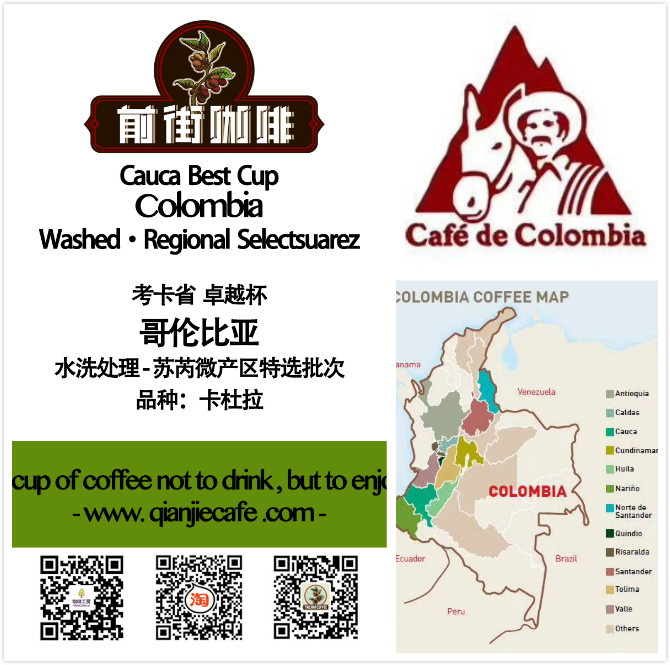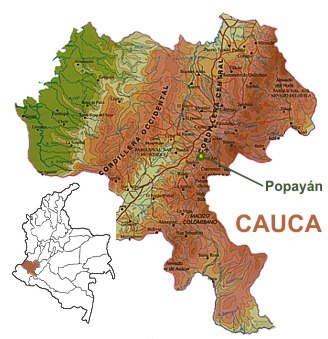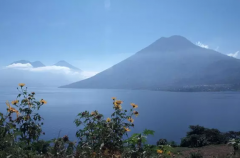2017 new season Colombia Huilan micro-batch Huilan province St. Augustine boutique coffee raw beans
New Coffee-- Colombia
The natural geographical environment of the Andes, the unique pozzolanic soil of the region and the elaborate artificial processing have created the outstanding performance of this bean cup: the aroma is strong and full of personality-it is an ingenious blend of fresh acidity, almonds and cocoa aromas that stimulate the taste buds like grapes. the bright acidity in the sweet tone of the entrance is elegant and bright, mellow and smooth, extremely smooth. Soft and smooth to a lasting finish, you can still feel the sweet chocolate flavor. Of course, this is the flavor of moderate high roasting, and in a cold winter, we can bake it deeper, a steaming cup of coffee, the moment of entrance-the sweetness of caramel and the bitterness of chocolate warm from the tip of the tongue to the stomach in a syrup-like liquid-the most secure warmth in winter.
In the depths of the high, winding Andes, at the bifurcation between the Cordillera and the Eastern Cordillera, the Magdalena River rises here and extends to the distant Caribbean, the boundless Papas wilderness stretches from antiquity to the unknown future.
As early as the 1st century to the 8th century AD, the Indians created a splendid and prosperous culture here, and there are still huge stone people standing on the high hills-they guard the sarcophagus for thousands of years. The ancient and mysterious Indians left a lot of stone carving art with their superb skills, and there are still many unsolved mysteries for future generations-these great sites are concentrated in St. Agustine Archaeological Park. the park was listed as a World Heritage site as early as 1995.
Today, the local people still live on the land left by their ancestors. They believe in the sacred power of the towering mountains and dense forests around them, and believe that nature is the land that gives them the land to thrive and work. Industrious people use their hands to produce naturally given food-the most important of which are corn and coffee.

Columbia Na Linglong FNC Fine Coffee
Na Linglong has the natural conditions for producing high-quality coffee, close to the equator, about 1 degree north latitude, and plenty of light throughout the year. Steep mountains and long and steep slopes bring temperature diversity. Warm and moist air rising from the canyon protects coffee grown at high altitude from the threat of frost, and coffee can be grown smoothly at a height of 2300 meters. Volcanic soil provides rich nutrients for coffee growth.
Nalinglong has a peak distribution of rainfall throughout the year, with a rainy season that lasts from October of that year to May of the following year. However, even in dry months, warm currents from trade winds from the southern continent meet with cooler nights to produce water vapor that replenishes coffee trees. Usually, coffee trees usher in flowering season after continuous drying followed by a heavy rain. In Nalinglong, after the first rain in September, there will be a coffee flowering season; the following April, the harvest season begins one after another, and in high-altitude producing areas, the harvest season may last until August.
Background introduction
The raw bean comes from El Trevol, a farm in Nelso Munoz, covering an area of 5 acres (1 acre ≈ 6 acres ≈ 4047 square meters).
The farm is located in St. Augustine, a well-known boutique coffee producing area in Huilan. In 2012, we also encountered another delicious dish from Augustine.
Nelso obtains more technical support by working with coffee traders to adopt the latest agricultural technologies. At the same time, Nelso is keen on environmental protection, and the farm is close to Macizo, where the Andes begin to extend into regional tributaries and are the source of important rivers in Colombia.
Non-profit agricultural cooperative
The agricultural cooperative, which produces Na Linglong, was established on February 18, 2003. it is located in the town of La Union, Nalinglong District, southern Colombia. She is a non-profit cooperative established from a social and economic point of view. The aim is to bring our partners, landowners, farmers and the whole community together to add value to coffee products in the process of autonomy.
The cooperative collects coffee from 21 partners and from 100 households that grow coffee. The combination of mid-harvest and post-harvest treatment produces a special appearance and taste of coffee, with obvious aroma and high acidity, forming a typical, mild taste of coffee, its unique temperament, so that demand around the world is in short supply.
Colombia (South America)
This is the second largest coffee industry after Brazil, and is also the leader in the Columbia Maird Group (Colombia, Tanzania, Kenya). In addition, there are Asa Maird, Anwar Snow Arabica, Robsta). The more famous producing areas, such as "Medellin", "Manizarez", "Bogota" and "Armenia", all the coffee beans cultivated are Anicabi species, which are quite rich in taste and stable in quality and price. The fried coffee beans are even bigger and more beautiful.
From low-grade products to high-grade products can be produced, some of which are rare good goods in the world, the taste is so mellow that people can't put it down.
The characteristics of the taste: sour, bitter, sweet and strong, the color is like a brewed wine.
[Colombia]: Colombia is an important producer of commercial Arabica coffee
[Cauca]: Cauca province, the production season is from March to June, Cauca province, named after the Cauca River, Cauca River. Located in southwestern Colombia, it is an important producing area of Colombian boutique coffee together with Narino Department and Huila Department.
[Micro lot]: micro batch
[FNC]: Colombian Federation of Coffee producers, founded in 1927, is fully responsible for coffee-related matters, including coffee planting technology research, sales, marketing, quality standard construction, education and training for coffee farmers, etc.
[Caturra]: Kaddura, a natural variety of Arabica variety bourbon
In 2001, some farmers took the lead to unite and set up a cooperative called La Asociacion Los Naranjos de San Augustin in order to improve production management technology and produce high-quality "specialty coffee". At present, the cooperative has been joined by more than 50 farmers, with a total planting area of 150 hectares, with an average area of 2.8 hectares per household. The yield per hectare can reach 1500mur2000 kg in the main harvest season, and the second harvest season accounts for about half of the main harvest season. Farms ranging from 1300 to 1950 meters above sea level are scattered around the town of Agustine, and each family forms its own farm. Excellent production and processing technology and stable quality make the area the face of high-quality coffee in Colombia.
Region: Agustine, southern Uila province, Colombia
Altitude: 1300 Murray 1950 meters
Number of peasant households: 50
Total area: 150 ha
Variety: typica
Picking: 100% hand picking
Processing: completely washed
Drying method: sun drying

Taobao link: https://item.taobao.com/item.htm?spm=a1z10.5-c.w4002-15673140460.18.62a15127ffHuDj&id=528153195308
Important Notice :
前街咖啡 FrontStreet Coffee has moved to new addredd:
FrontStreet Coffee Address: 315,Donghua East Road,GuangZhou
Tel:020 38364473
- Prev

Effect of hand flushing temperature of coffee bean treated with honey on flavor
The geographical location of Costa Rica is one of the famous coffee producing areas in the world. The coffee produced is full of particles, ideal acidity and unique strong flavor. The washed Arabica coffee beans are bright and fragrant, as clear as wind chimes swaying in the breeze, mild acidity and sweetness. Because of the sweetness, even if the coffee gets cold, it tastes very good.
- Next

Comparison of Flavor Test results of High-quality Coffee Bean Cup in Sonora Coffee Manor
Some people speculate that it has been planted since the Persian dynasty. Later, the French long River area has been widely planted, and is a very popular local wine. Today, the enthusiasm of growing Silas in Australia far exceeds that of the Rhone River region in France, becoming the main producer of Silas. At this point, we should have some description of the flavor of this bean, then there is not much nonsense, let's take a look at the number.
Related
- Detailed explanation of Jadeite planting Land in Panamanian Jadeite Manor introduction to the grading system of Jadeite competitive bidding, Red bid, Green bid and Rose Summer
- Story of Coffee planting in Brenka region of Costa Rica Stonehenge Manor anaerobic heavy honey treatment of flavor mouth
- What's on the barrel of Blue Mountain Coffee beans?
- Can American coffee also pull flowers? How to use hot American style to pull out a good-looking pattern?
- Can you make a cold extract with coffee beans? What is the right proportion for cold-extracted coffee formula?
- Indonesian PWN Gold Mandrine Coffee Origin Features Flavor How to Chong? Mandolin coffee is American.
- A brief introduction to the flavor characteristics of Brazilian yellow bourbon coffee beans
- What is the effect of different water quality on the flavor of cold-extracted coffee? What kind of water is best for brewing coffee?
- Why do you think of Rose Summer whenever you mention Panamanian coffee?
- Introduction to the characteristics of authentic blue mountain coffee bean producing areas? What is the CIB Coffee Authority in Jamaica?

